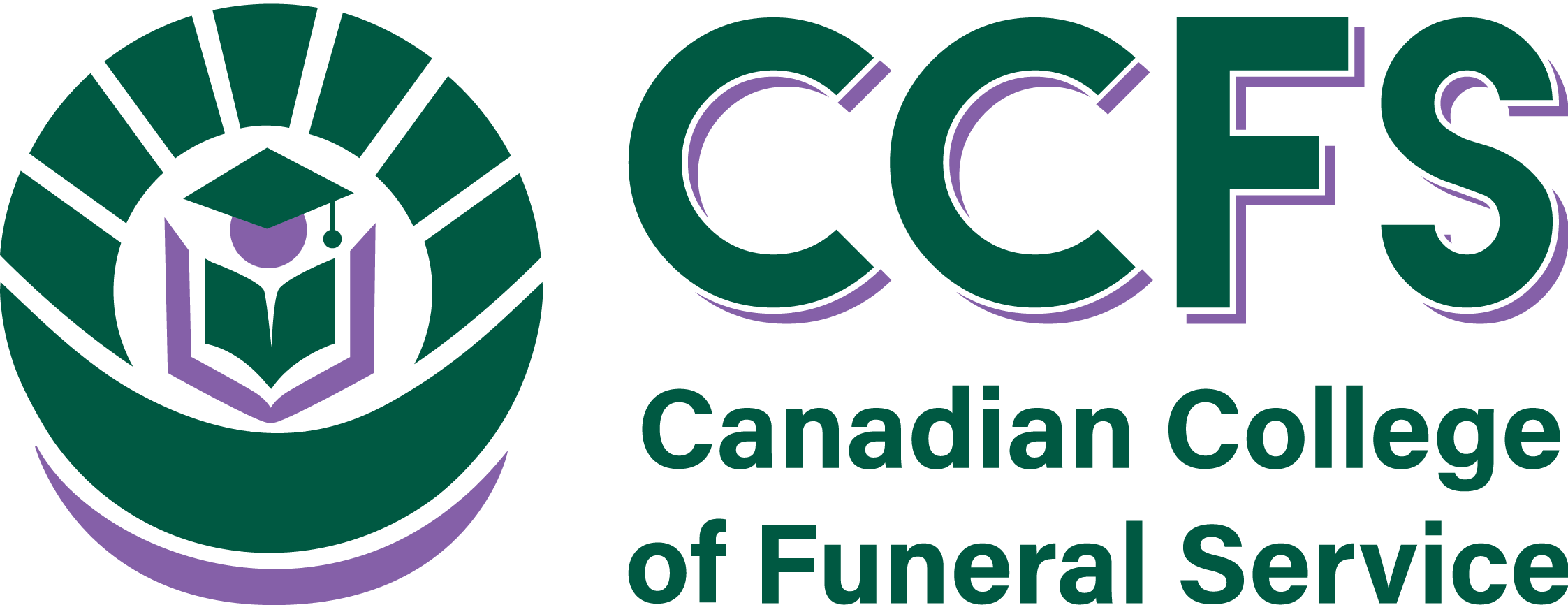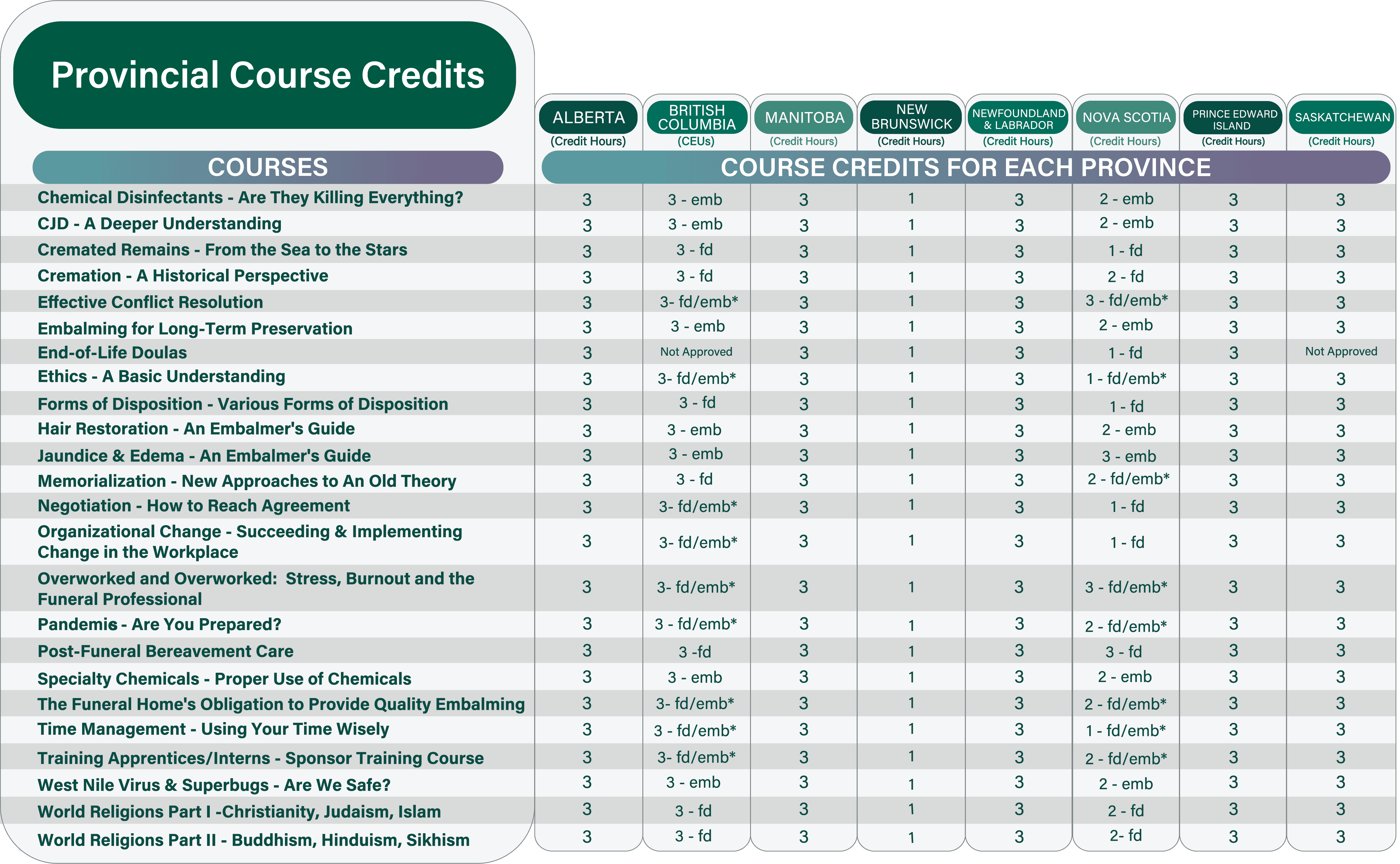Continuing Education Online
Continuing Education Online

For Licensed Funeral Directors and Embalmers
Welcome to the Canadian College of Funeral Service’s continuing education online portal. We are committed to creating and providing quality courses for all funeral service professionals. Education never stops and helps us serve our families and community to the best of our knowledge and ability. Thank you for considering and choosing CCFS for your professional development.
Fulfilling your continuing education requirements online with CCFS is an easy process. You will find a list of available online courses by following the 3 steps below. You can register and complete our online courses at your convenience anytime, anywhere, and at your pace, whether it be in one or multiple sessions.
Our courses meet all provincial continuing education credit hours for your licensing requirements, so please visit our available courses, select, and register to get started.
How To Register
BROWSE COURSES
Please click on the button below labeled “BROWSE COURSES”
to view all the available courses.
The cost per course is $100.
REGISTER FOR COURSE
CERTIFICATION

Frequently Asked Questions

Question 1: How Do I Register?
To checkout, go to your shopping cart and follow the prompts.
Question 2: What forms of payment do you take?
- VISA and Mastercard:
To access your chosen course(s) immediately, payment must be made with VISA or Mastercard. You will receive an email with your order confirmation and the access link to the course(s) you purchased.
- E-Transfer:
For e-Transfer, please send to hradmin@ccfs.ca
- Cheques:
For cheques, please make payable to:
Canadian College of Funeral Service
Unit #1 – 1596 Regent Avenue West
Suite #360
Winnipeg, MB R2H 4C4
E-Transfer and cheque do not allow immediate access to your chosen course(s). You will receive an invoice by email with payment instructions. Once payment is received, you will receive an email with your order confirmation and the access link to the course(s) purchased.
Question 3: How many credit hours are each course?
*Please read: course credits are applied to either funeral director or embalmer (not both)*
Question 4: How long does a course take? Do I have to take it all at once? How much time do I have to complete a course?
- Each course is created to take approximately three (3) hours and consists of two components:
- Reading material (learning objectives and lesson notes)
- Quiz
- The course is designed for you to take at your own pace. You can do the course all in one or multiple sessions, allowing you to leave and return to the reading material and quiz as often as you wish.
- The time limit to complete the course is two (2) months from the purchase date.
- If an extension is required, a fee of $75.00 per course will be charged for an additional thirty (30) days to complete the course.
Question 5: What is the passing grade? What happens if I do not pass the quiz?
- 70% is the passing grade for all continuing education courses.
- If you receive less than 70% on the quiz, a second attempt is allowed at no additional cost.
The quiz is graded automatically, and the system allows a second attempt immediately.
However, you may want to review the reading material before starting the second attempt. - If you receive less than 70% on the quiz after two (2) attempts, you must contact our office and pay an additional fee of $100.00 for a third attempt.
- The quiz may be completed in an open-book format, and you may review the reading material to answer the quiz questions.
Question 6: What happens after I finish and pass a course? How do I get my certificate of completion?
- Upon passing a course, a certificate of completion will automatically be available to download, save, or print. Instructions are provided in the course material under the “Course Completion” tab.
- You are responsible for downloading, saving, or printing the certificate within thirty (30) days of completion. After thirty (30) days, you will no longer have access to the reading material and certificate of completion.
- Please contact our office if you require your certificate of completion after the thirty (30) days of course completion. A fee of $50.00 per course will be applied to issue the certificate of completion.
Question 7: How is my provincial regulatory agency notified?
- Submission requirements vary with each provincial regulatory agency.
- A table with the submission requirements and instructions for each province is available in the course material for you to review and submit according to your provincial regulatory agency.
As a licensee, you are responsible for staying current with your provincial regulatory agency’s requirements. CCFS will not be liable for changes or if you submit incorrectly.
Question 8: What happens if I take a course twice?
- You are responsible for recording which course(s) you take.
- CCFS is not liable if a course is taken twice. No refund will be issued.
Once a learner or licensee sets up an account on our website, the course(s) taken will be recorded. The learner or licensee will have access to these recorded course(s) through their account profile.
Question 9: Can I get a refund?
Question 10: What if I have comments, questions, or a concern?
Please contact:
Canadian College of Funeral Service
Unit #1 – 1596 Regent Avenue West
Suite #360
Winnipeg, MB R2H 4C4
Phone: 888-797-9941
continuingeducation@ccfs.ca
We're not the only ones EXCITED about CCFS...
1000s of students can't be wrong, don't put it off, enroll today!

